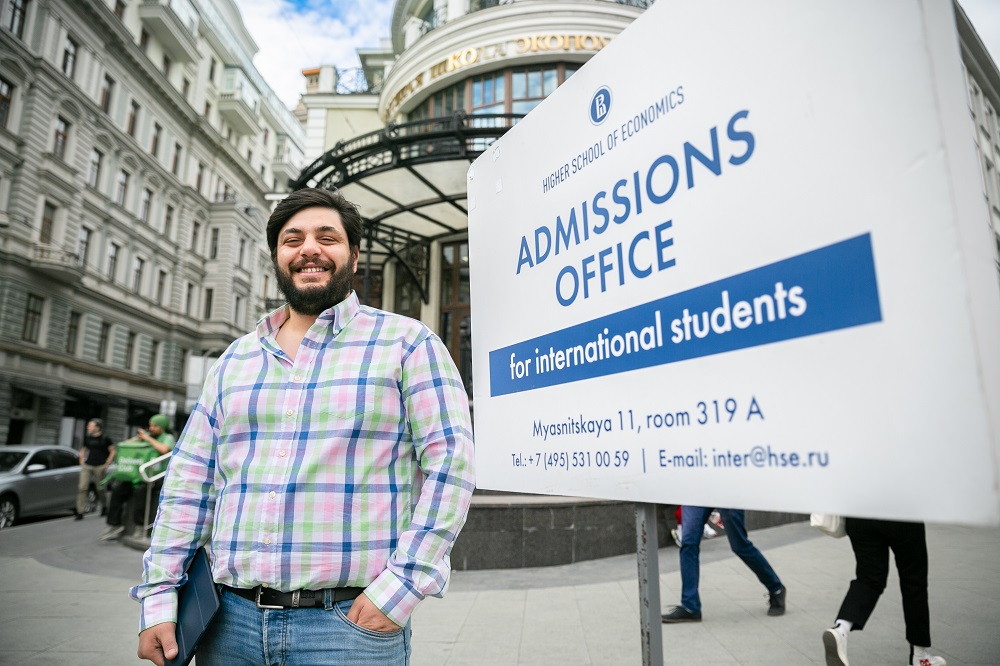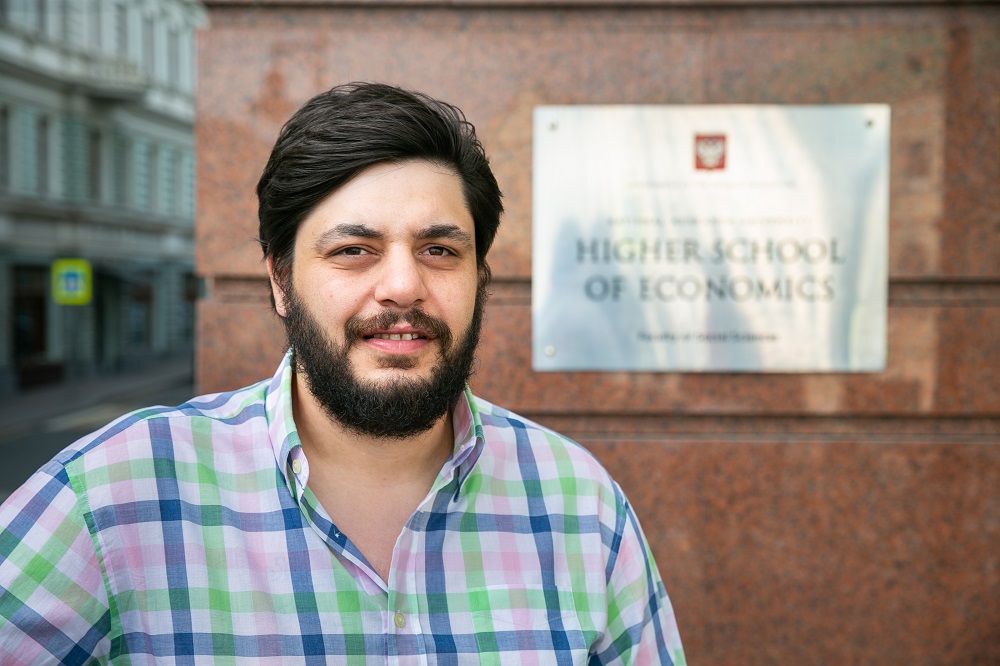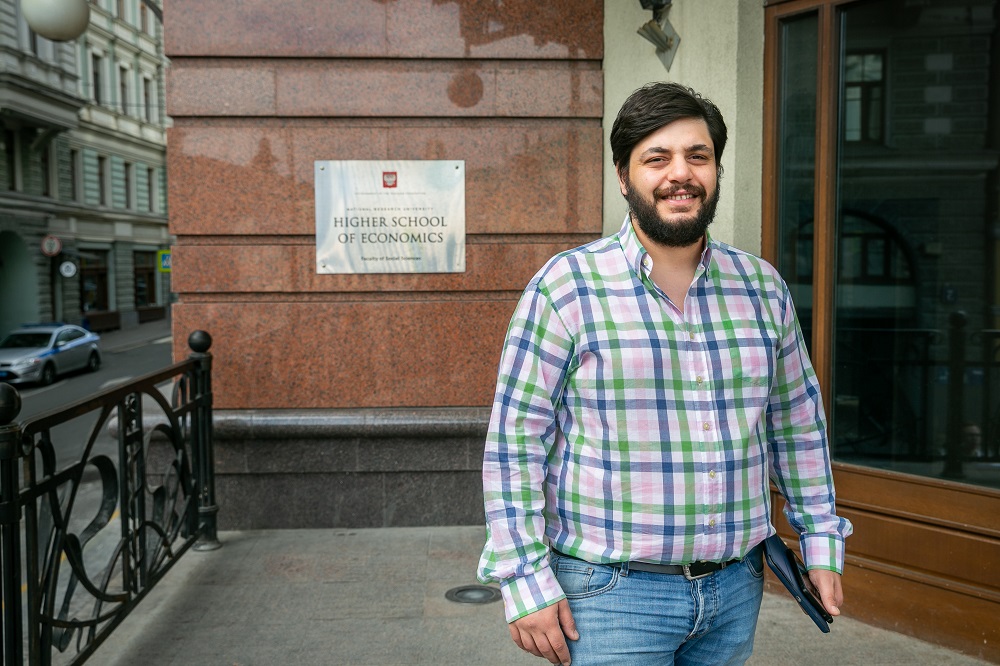‘If You Are Dedicated and Hardworking, You Will Get a Top Education’

Coming from Lebanon but with personal ties to Russia, Hisham Haydar will be starting the second year of the Master’s in Economics: Research Programme this September. The strength of HSE University’s standing in international rankings led Hisham to choose HSE in Moscow for his advanced training in economics. In the hope that other international students will be motivated to apply to HSE, he recently shared his perspective on everything from the application process to the workload to life in Moscow.
On Academics
 Applying and studying
Applying and studying
The application process is pretty straightforward – all the relevant information can be found on the International Admissions website. When I had questions, I emailed the staff, and they answered promptly and helped me a lot. The whole process took about 2 months. It is very convenient that everything can be done online.
Economics: Research Programme is actually an advanced academic programme that is geared towards PhD study and careers in academia. While it is different from other, more applied programmes, I am enjoying it because it prepares you for different fields of economics research and helps with getting publications.
The programme is taught both in Russian and English. Most courses are in English, but some, such as Maths, Statistics and Econometrics, are taught in Russian. This wasn’t a big issue for me because all the teachers speak English well - they explained things that I couldn’t understand because of the language. Even though I speak Russian, it’s not sufficient for technical and scientific fields. The teachers even recommended a couple of books in English that are similar to the ones in Russian. This helped me a lot. Moreover, even though the courses were in Russian, it was possible to take the exams in English. I also wrote my term paper in English this year, which was very convenient for me.

 Workload
Workload
The programme is intensive – you need to work hard and study a lot. All our classes are in the morning or daytime. Still, I am able to combine my studies with work. I have my own tutoring centre in Lebanon, which I manage online. I also teach Economics and Finance online to students from all over the world. Since my work has flexible hours and can be done online, it doesn’t have a negative effect on my studies. That said, I dedicate some time to studying every day in order to truly benefit from the programme.
At the moment, I am the only international student in the programme, but next year it will be taught exclusively in English, so there will probably be more international students. Studying with Russian students has not been difficult for me at all – I fit right in because I’m familiar with the culture and the language. The group is very friendly. We also connect sometimes with students from other programmes. The people here are really nice.
 Research and courses
Research and courses
Next year I will be writing my thesis under the supervision of Eren Arbatli as a continuation of the coursework I did this year. My focus is on the economics of forced migration – the refugee crises – in Lebanon. We are currently hosting more than 1 million refugees, mostly from Syria. At the moment, we have the highest refugee-to-resident ratio in the world. Forced migration has both positive and negative economic effects. To research this topic, I’m working with the data available online. It’s very helpful that I can access any research paper I need through HSE University’s electronic library.

On Life in Moscow
 How Russian is Moscow?
How Russian is Moscow?
I first came to Russia in 2010, and my first visit to Moscow was a year later. I have also lived in Ukraine, which is actually where I learned Russian – that was back in 2005. So, I can say I was familiar with the Russian culture and knew the language to some extent.
But Moscow is not Russia. All Russian cities have their own traditions because the country is so large. Moscow is different from other parts of the country – it’s a true metropolis. It has everything and everybody in it: people from the Middle East, Africa, America, Asia, and Europe. It’s a mixed culture, truly international.
There is a certain Russian proverb that says, ‘Moscow welcomes everyone’ and I can say that yes, it actually does welcome everyone
It tolerates all kinds of cultures and traditions. You can find everything here. As long as you are doing what you came here to do, you are going to enjoy and love it. You won’t find it hard to integrate into the city.
Moscow is not the same city as you see portrayed on TV or in the movies. For example, there is no thick Russian accent you find in the movies. It’s good to know at least some basic Russian, but younger people generally speak English so international students won’t find it hard to live here.
And for those who assume that Moscow is really expensive, it’s actually not if we compare it to other countries. Renting an apartment is a considerable expense here, but everything else is quite reasonably priced.
 Things to get used to
Things to get used to
The city is huge. If you rent an apartment in the suburbs, you will spend a lot of time commuting. I have spent a year here, and I still don’t know it all. You need time to get used to how big the city is.
The weather in Moscow is a bit weird for me. In the morning, it can be hot, like now in the summer, but then in a couple of hours it changes, gets cold and starts raining. The winters here are not that bad. I had already experienced Ukrainian winters, which are similar, and I spent a winter in Yoshkar Ola and Kazan, where it was around negative 35; that was much harder than Moscow. Still, it took me some time to adapt to the local weather.

![]() HSE dorms
HSE dorms
During the first semester, I lived at HSE University Dorm #7 in Tekstilschiki. It’s about 15 minutes from the centre. I was pleasantly surprised by the dorm. Half of the residents are Russian, and half are international students. It’s a new dormitory so everything there is new and clean. Of course, it is not the same as living in one’s own apartment, but it’s quite comfortable. I made a lot of friends at the dormitory, both full degree students and exchange students from all over the world. Even though I am renting a flat and don’t live at the dormitory anymore, I still often meet with my friends from the dorm to play football.
 Getting around
Getting around
The transportation in Moscow is really well structured. It is easy to reach wherever you are going, and you don’t need to walk a lot. The metro, buses, taxis, and trains are readily available. Students get a discount on the transport pass, which is nice. In comparison to any other country, I would say the transportation is almost free.
Advice to New Students
Be prepared and study well! You have to study and not waste your time here. If you are planning to come to HSE University, you have to be dedicated and hardworking. If you are, you will get a top education and one of the best degrees available. But you need to do your part.
Admissions to HSE’s Master’s programmes are now open. International students can apply online. To learn more about HSE University, its admission process, or life in Moscow, please visit International Admissions website, or contact the Education & Training Advisory Centre at: inter@hse.ru, or via WhatsApp at: +7 (916) 311 8521.
Photos by Mikhail Dmitriev/ HSE University
Cemal Eren Arbatli
Assistant Professor at the Department of Theoretical Economics

